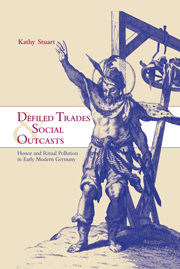Book contents
- Frontmatter
- Contents
- List of illustrations
- Acknowledgments
- List of abbreviations
- Glossary
- Introduction: defiled trades
- PART I THE MEANING OF DISHONOR IN EARLY MODERN SOCIETY
- PART II THE DISHONORABLE MILIEU
- PART III PARADOXICAL DISHONOR: PUNISHMENT AND HEALING
- 5 The infamous fur coat, or the unintended consequences of social discipline
- 6 The executioner's healing touch: health and honor in early modern German medical practice
- PART IV ARTISANAL HONOR AND URBAN POLITICS
- Conclusion: dishonor and the society of orders
- Selected bibliography
- Index
- CAMBRIDGE STUDIES IN EARLY MODERN HISTORY
5 - The infamous fur coat, or the unintended consequences of social discipline
Published online by Cambridge University Press: 06 August 2009
- Frontmatter
- Contents
- List of illustrations
- Acknowledgments
- List of abbreviations
- Glossary
- Introduction: defiled trades
- PART I THE MEANING OF DISHONOR IN EARLY MODERN SOCIETY
- PART II THE DISHONORABLE MILIEU
- PART III PARADOXICAL DISHONOR: PUNISHMENT AND HEALING
- 5 The infamous fur coat, or the unintended consequences of social discipline
- 6 The executioner's healing touch: health and honor in early modern German medical practice
- PART IV ARTISANAL HONOR AND URBAN POLITICS
- Conclusion: dishonor and the society of orders
- Selected bibliography
- Index
- CAMBRIDGE STUDIES IN EARLY MODERN HISTORY
Summary
In the preceding two chapters our focus has been the dishonorable milieu itself. We have detailed the legal, economic, and social effects of dishonor in order to reconstruct the experience and self-identity of dishonorable people. We now turn to the logic of pollution in the minds of honorable artisans who labeled these groups as dishonorable. Artisans identified two main sources of dishonor pollution: contact with animal carcasses and involvement in the performance of criminal punishment Artisans' pollution anxieties surrounding carrion will be discussed in chapter 7. Here we are concerned with the transmission of pollution in the context of criminal justice. Guildsmen labeled bailiffs as dishonorable by associating them with the executioner. Augsburg's bailiffs tried to ward off the attribution of dishonor by emphasizing that they did not assist the executioner. But this defense was futile, for in the minds of artisans dishonor permeated the entire sphere of criminal justice. Punishment meted out in the name of sovereign authorities (Obrigkeit) was central to artisans' ideas about dishonor. The day-to-day administration of criminal justice produced a diffuse dishonor that spread far beyond the criminal who was being punished. Dishonor produced in the course of criminal punishments resulted not only in the clear-cut and spectacular infamy of the executioner and the condemned criminal on the scaffold. Dishonor also spread in directions unforeseen and unintended by the authorities, as they orchestrated ever more elaborate rituals of punishment in the early modern period.
- Type
- Chapter
- Information
- Defiled Trades and Social OutcastsHonor and Ritual Pollution in Early Modern Germany, pp. 121 - 148Publisher: Cambridge University PressPrint publication year: 2000



